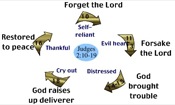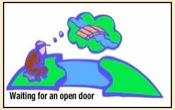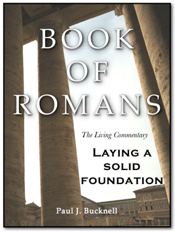
King Saul's Disobedience and Demise
Bible Study Questions
1 Samuel 15
Paul J. Bucknell
Introductory | The Crisis (1 Samuel 15:1-3) | The Response (1 Samuel 15:4-9)
The Test (1 Samuel 15:10-15) | The Excuse (1 Samuel 15:16-23)
The Confession (1 Samuel 15:24-31) | The Future (1 Samuel 15:32-35)
Bible Study Questions | mp3 Podcast
_________________________
This study of 1 Samuel 15 provides a great setting to further understand the calling of God. Do you understand God's calling or simply confused about it? We will first look at God’s call in 1 Samuel 9 and then God’s confirmation of this call in 1 Samuel 10. 1 Samuel 11 describes the affirmation of Saul’s call (not in this study).
 Check out our Digital Old Testament Library for a huge collection of resources on 1 Samuel and all of the Old Testament!
Check out our Digital Old Testament Library for a huge collection of resources on 1 Samuel and all of the Old Testament!
A Soul Test (only two questions!)
- How close or far are you away from the Lord?
1 - Rather distant | 3 - Not too close | 5 - Lukewarm | 7 - Eagerly growing
- Do you compromise what God expects of you?
1- Don’t care | 3 - Compromise. No big deal | 5 - I try not | 7 - I don’t compromise/repent
A) The Crisis: Opportunity and Temptation (1 Samuel 15:1-3)
“Then Samuel said to Saul, “The LORD sent me to anoint you as king over His people, over Israel; now therefore, listen to the words of the LORD. “Thus says the LORD of hosts, ‘I will punish Amalek for what he did to Israel, how he set himself against him on the way while he was coming up from Egypt. ‘Now go and strike Amalek and utterly destroy all that he has, and do not spare him; but put to death both man and woman, child and infant, ox and sheep, camel and donkey” (1 Samuel 15:1-3).
-
What is the point of what Samuel said to Saul in verse 1?
-
The Lord shares with Saul His reason for fighting Amalek. What did the Lord tell him about the reason He wants to destroy the Amalekites (15:2)?
-
What did God specifically command King Saul (15:3)?
-
Why did God want to kill even the women and children?
-
Why does the Lord carry such a long-lasting ‘grudge’?
- How come we are to forgive when God does not?
B) The Response: Tolerating a Little Sin (1 Samuel 15:4-9)
“Then Saul summoned the people and numbered them in OT, 200,000 foot soldiers and 10,000 men of Judah. And Saul came to the city of Amalek, and set an ambush in the valley. And Saul said to the Kenites, “Go, depart, go down from among the Amalekites, lest I destroy you with them; for you showed kindness to all the sons of Israel when they came up from Egypt” (So the Kenites departed from among the Amalekites. So Saul defeated the Amalekites, from Havilah as you go to Shur, which is east of Egypt. And he captured Agag the king of the Amalekites alive, and utterly destroyed all the people with the edge of the sword. 9 But Saul and the people spared Agag and the best of the sheep, the oxen, the fatlings, the lambs, and all that was good, and were not willing to destroy them utterly; but everything despised and worthless, that they utterly destroyed” (1 Samuel 15:4-9).
-
What was good about what Saul did (15:4-8)?
-
Did Saul make good his opportunity to obey the Lord? How so? (15:9)?
- Saul was very happy with his attack (12). Do you think he should be so? Why or why not?
C) The Test: Differing Opinions (1 Samuel 15:10-15)
“Then the word of the LORD came to Samuel, saying, 11 “I regret that I have made Saul king, for he has turned back from following Me, and has not carried out My commands. And Samuel was distressed and cried out to the LORD all night. 12 And Samuel rose early in the morning to meet Saul; and it was told Samuel, saying, “Saul came to Carmel, and behold, he set up a monument for himself, then turned and proceeded on down to Gilgal. 13 And Samuel came to Saul, and Saul said to him, “Blessed are you of the LORD! I have carried out the command of the LORD.” 14 But Samuel said, “What then is this bleating of the sheep in my ears, and the lowing of the oxen which I hear?” 15 And Saul said, “They have brought them from the Amalekites, for the people spared the best of the sheep and oxen, to sacrifice to the LORD your God; but the rest we have utterly destroyed” (1 Samuel 15:10-16).
-
What was God’s perspective about what Saul did (15:10-11)?
-
What does the monument tell us about Saul (15:12)?
-
Did Saul believe he carried out the Lord’s command (15:13)? Why might we doubt it?
-
How did Samuel point out Saul’s inconsistency in carrying out God’s command (15:14)?
-
Should the Lord overlook a few minor things if we largely accomplished what He wanted? Why or why not?
- How can God's view be so different than Saul's? Does God think of us this way? How can we prevent such delusion on our part?
D) The Excuse: Shifts Blame (1 Samuel 15:16-23)
“Then Samuel said to Saul, “Wait, and let me tell you what the LORD said to me last night.” And he said to him, “Speak.” And Samuel said, “Is it not true, though you were little in your own eyes, you were made the head of the tribes of Israel? 18 And the LORD anointed you king over Israel, and the LORD sent you on a mission, and said, ‘Go and utterly destroy the sinners, the Amalekites, and fight against them until they are exterminated.’ “Why then did you not obey the voice of the LORD, but rushed upon the spoil and did what was evil in the sight of the LORD?”
Then Saul said to Samuel, “I did obey the voice of the LORD, and went on the mission on which the LORD sent me, and have brought back Agag the king of Amalek, and have utterly destroyed the Amalekites. “But the people took some of the spoil, sheep and oxen, the choicest of the things devoted to destruction, to sacrifice to the LORD your God at Gilgal (1 Samuel 15:16-21).
-
How did Saul respond to Samuel’s request to speak what he heard that night from the Lord? Why might he be so eager to hear (16)?
-
Review verse 17 and how Saul got to be the king of Israel. Give an incident that reminds us how Saul considered himself little in his own eyes (Use past chapters).
-
What did Samuel tell Saul in 15:18-19? What detail was added here?
-
How did Saul answer Samuel (15:20-21)? What do you think about his answer?
-
How did Saul shift blame from himself to others in 15:21?
-
Explain in your own words the most powerful part of verses 15:22-23?
-
How did Saul commit divination (Literally witchcraft) (22-23)?
- How could Saul misunderstand the importance of following every detail? Where did he go wrong?
E) The Confession: Reveals his Superficial Heart (1 Samuel 15:24-31)
“Then Saul said to Samuel, “I have sinned; I have indeed transgressed the command of the LORD and your words, because I feared the people and listened to their voice. 25 Now therefore, please pardon my sin and return with me, that I may worship the LORD” (But Samuel said to Saul, “I will not return with you; for you have rejected the word of the LORD, and the LORD has rejected you from being king over Israel” 27 And as Samuel turned to go, Saul seized the edge of his robe, and it tore. So Samuel said to him, “The LORD has torn the kingdom of Israel from you today, and has given it to your neighbor who is better than you. 29 And also the Glory of Israel will not lie or change His mind; for He is not a man that He should change His mind.” Then he said, “I have sinned; but please honor me now before the elders of my people and before Israel, and go back with me, that I may worship the LORD your God.” So Samuel went back following Saul, and Saul worshiped the LORD” (1 Samuel 15:24-31).
-
What did Saul admit to doing in 1 Samuel 15:24?
-
What was the reason Saul gave for allowing the people to have the forbidden animals (15:24)?
-
What did Saul request of Samuel in 15:25? Why?
-
How did Samuel respond to his request (26)?
-
How would you describe the scene in 27?
-
How did Samuel use that to communicate something to Saul about his future (28)?
-
Why might Samuel add these words about God in 29?
-
Why do you think Samuel went back with Saul after his second request for him to accompany him (30-31)?
-
How might the fear of man cause people to disobey? Are you a people pleaser? Do you feel like you ought to do what others want?
- Have you ever said, “Sorry,” but not really meant it?
F) The Future: Arrogance Perpetuates Problems (15:32-35)
“Then Samuel said, “Bring me Agag, the king of the Amalekites” (And Agag came to him cheerfully. And Agag said, “Surely the bitterness of death is past” (But Samuel said, “As your sword has made women childless, so shall your mother be childless among women” (And Samuel hewed Agag to pieces before the LORD at Gilgal. Then Samuel went to Ramah, but Saul went up to his house at Gibeah of Saul. And Samuel did not see Saul again until the day of his death; for Samuel grieved over Saul. And the LORD regretted that He had made Saul king over Israel” (1 Samuel 15:32-35).
-
How does one repent? How should Saul have repented here?
-
What did Samuel do in 32-33? Why? Whose responsibility was it?
-
What do you think happened to all the animals taken back by the army? How might this affect the people in the long term (cf. 15:19)?
-
What happened between Samuel and Saul (34-35a)? Why do you think this happened?
-
How would you paraphrase the last sentence of the chapter about the Lord (35b)? How can God ‘regret’ (along with 15:11)? Didn’t God do make him king?
Conclusion
-
Where are you now in your spiritual walk?
-
Opportunities > Temptations > Pride > Denial > Consequences > Hardness
-
See if there are any areas in which you have compromised or minimized?
-
Look at these things from God’s perspective and rightly handle them.
Next -> Read the 1 Samuel 15 study to help find the answers or listen to the podcast.








